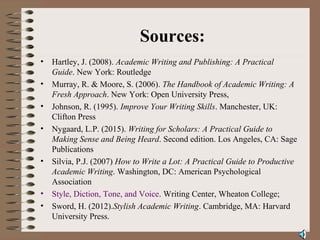This document defines academic writing and provides guidelines for effective academic style. It explains that academic writing uses a formal tone, precise word choice, and focuses on investigating problems. It emphasizes using a logical structure, unbiased language, precise punctuation, and citing sources to avoid plagiarism. Additionally, it stresses writing in a thesis-driven manner and addressing topics with complexity and higher-order thinking. While allowing the use of jargon specific to a topic, it warns against using needlessly complex syntax or vocabulary without context. Problems to avoid include excessive specialized terms, inappropriate jargon, personal pronouns, directives, informal tone, wordiness, unexplained lists, and personal experiences.
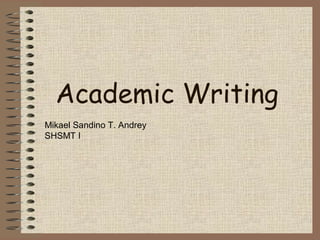


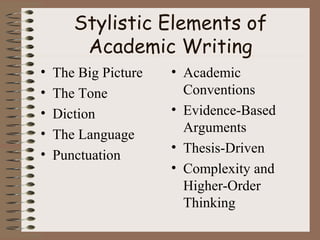


![Diction
• Diction refers to the choice of words
you use. Awareness of the words you
use is important because words that
have almost the same denotation
[dictionary definition] can have very
different connotations [implied
meanings].](https://image.slidesharecdn.com/academicwriting-180718150520/85/Academic-writing-7-320.jpg)

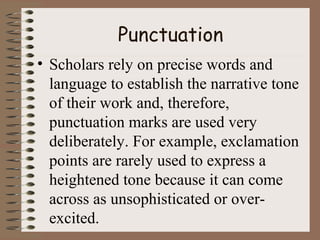
![Punctuation
• Dashes should be limited to the insertion of
an explanatory comment in a sentence while
hyphens should be limited to connecting
prefixes to words [e.g., multi-disciplinary]
or when forming compound phrases [e.g.,
commander-in-chief]. Finally, understand
that semi-colons represent a pause that is
longer than a comma, but shorter than a
period in a sentence.](https://image.slidesharecdn.com/academicwriting-180718150520/85/Academic-writing-10-320.jpg)
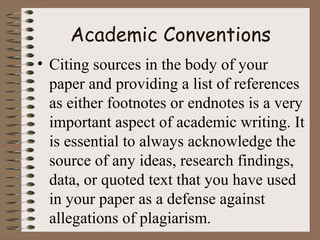
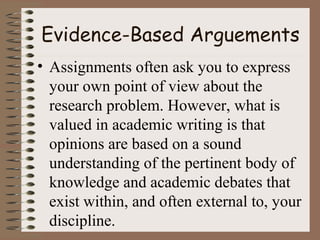
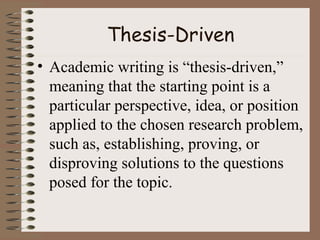
![Complexity and H.O.T.
• Academic writing addresses complex issues
that require high-order thinking skills to
comprehend [e.g., critical, reflective,
logical, and creative thinking]. Think of
your writing this way: One of the most
important attributes of a good teacher is the
ability to explain complex ideas in a way
that is understandable and relatable to the
topic being presented.](https://image.slidesharecdn.com/academicwriting-180718150520/85/Academic-writing-14-320.jpg)
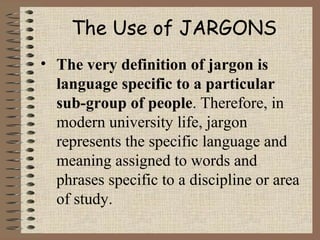
![The Use of JARGONS
• It is important that specialist
terminology [i.e., jargon] must be
used accurately and applied under
the appropriate conditions. It is
appropriate for you to use specialist
language within your field of study, but
you should avoid using such language
when writing for non-academic or
general audiences.](https://image.slidesharecdn.com/academicwriting-180718150520/85/Academic-writing-16-320.jpg)




![Personal Pronouns
• Excessive use of personal nouns [e.g.,
I, me, you, us] may lead the reader to
believe the study was overly
subjective. Using these words may be
interpreted as being done only to
avoid presenting empirical evidence
about the research problem.](https://image.slidesharecdn.com/academicwriting-180718150520/85/Academic-writing-21-320.jpg)
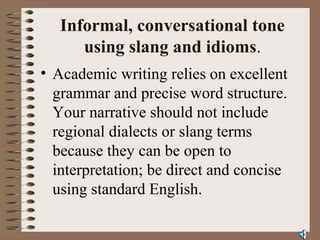

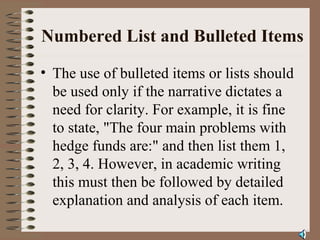
![Personal Experiences
• Drawing upon personal experience [e.g.,
traveling abroad; caring for someone
with Alzheimer's disease] can be an
effective way of engaging your readers in
understanding the research problem. Use
personal experience only as an example,
though, because academic writing relies
on evidence-based research. To do
otherwise is simply story-telling.](https://image.slidesharecdn.com/academicwriting-180718150520/85/Academic-writing-25-320.jpg)
